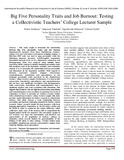| dc.contributor.author | Mutanana, Ngonidzashe | |
| dc.contributor.author | Senderayi, Patrick | |
| dc.contributor.author | Tshababa, Mqemane | |
| dc.contributor.author | Nyathi, Clement | |
| dc.date.accessioned | 2024-09-04T09:05:24Z | |
| dc.date.available | 2024-09-04T09:05:24Z | |
| dc.date.issued | 2019-10-10 | |
| dc.identifier.citation | Senderayi, P., Tshababa, M., Mutanana, N., & Nyathi, C. (2019). Big Five Personality Traits and Job Burnout: Testing a Collectivistic Teachers‟ College Lecturer Sample. Thematics Journal of Social Sciences, 2(2). | en_US |
| dc.identifier.uri | http://10.0.0.36:8080/xmlui/handle/123456789/298 | |
| dc.description.abstract | This study sought to determine the relationship between Big Five personality traits and job burnout dimensions.211 lecturers from three Zimbabwean teachers’ colleges were surveyed using a convenience sampling strategy. A fifty-item IPIP scale was used to map personality while the Oldenberg Burnout Inventory (OLBI-English translation) determined burnout levels on two dimensions; exhaustion and disengagement. Data were analysed using multiple linear regression (MLR) analysis to identify dominant personality traits that predicted each of the dependent variables, and correlation
analysis (CA) to determine the relationship between personality and dimensions in the dependent variables. With regards to
burnout, regression analysis mapped extraversion, conscientiousness, neuroticism and agreeableness as the dominant personality traits prevalent in the Zimbabwean teachers’ college lecturer sample. Furthermore, CA showed that extraversion, neuroticism, agreeableness and conscientiousness did not have any significant correlation with isengagement, while extraversion, neuroticism and conscientiousness had a significant negative and weak correlation with exhaustion. This suggests that lecturers who are high in extraversion, neuroticism and conscientiousness scores are likely to experience low levels of exhaustion. As there is currently no evidence of prior studies with a Zimbabwean teachers’ college lecturer sample, this study provides useful information for future research in collectivistic cultures. This study showed a weak relationship between personality and burnout, indicating potential for further related research. Future research should develop measures with local language-appropriate translations of the five-factor model and the OLBI in order to counteract the culture difference which could have made some of the lecturers fail to comprehend the
English nuances in the two measures. The convenience sample of 211 lecturers was large but non-random, and therefore not representative of the population of teachers’ colleges in Zimbabwe which severely limited the generalizability of the
findings of this study to other settings. Further studies using probability sampling may generate representative samples from which the findings can be generalized. | en_US |
| dc.language.iso | en | en_US |
| dc.publisher | International Journal of Research and Innovation in Social Science (IJRISS) | en_US |
| dc.subject | Job Demands and Burnouts | en_US |
| dc.subject | Big Five personality traits | en_US |
| dc.title | Big Five Personality Traits and Job Burnout: Testing a Collectivistic Teachers‟ College Lecturer Sample | en_US |
| dc.type | Article | en_US |

